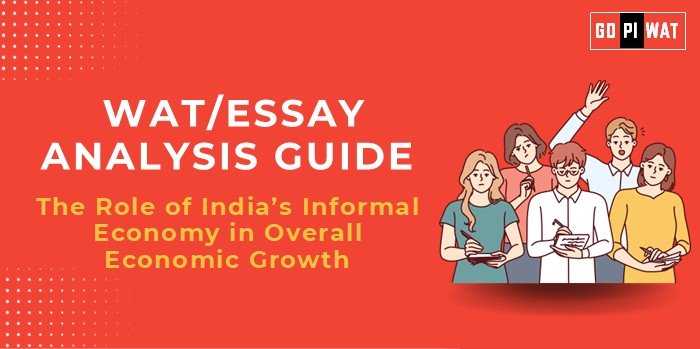📋 Written Ability Test (WAT)/Essay Analysis Guide
Topic: The Role of India’s Informal Economy in Overall Economic Growth
🌟 Understanding the Topic’s Importance
Context Statement: “The informal economy represents both a significant strength and a persistent challenge for India. While it sustains millions of livelihoods and contributes to GDP, its lack of formalization impacts economic efficiency and social equity.”
⏱️ Effective Planning and Writing
- Time Allocation:
- 📝 Reading and Planning: 5 minutes
- ✍️ Writing: 20 minutes
- 🔍 Reviewing: 5 minutes
- Preparation Tips:
- Highlight major achievements like employment contribution and economic resilience.
- Identify challenges such as lack of social security and limited access to credit.
- Gather relevant data and examples for support.
💡 Structuring the Essay
📄 Introduction
- Template A: “With 80% of India’s workforce in the informal sector, this unregulated yet vibrant segment is crucial for economic growth but faces systemic hurdles requiring urgent attention.”
- Template B: “India’s informal economy, contributing 50% to GDP, is a paradox of high potential and persistent challenges. Addressing its vulnerabilities can unlock significant economic benefits.”
📊 Body Paragraphs
🏆 Achievements
- Topic Sentence: “The informal economy is pivotal in sustaining livelihoods and supporting India’s GDP.”
- Evidence: 80% workforce engagement, significant role in micro-entrepreneurship.
- Example: Success stories like Rajasthan’s self-help groups fostering women-led informal enterprises.
⚠️ Challenges
- Problem Statement: “Despite its contributions, the informal sector is marred by vulnerabilities like limited access to social security and institutional credit.”
- Evidence: Over 70% of informal businesses rely on informal credit, creating dependency cycles.
- Case Study: Challenges faced during COVID-19, when informal workers were disproportionately impacted.
🚀 Future Perspective
- Current Status: Growing digitization and government initiatives like GST.
- Recommendations: Strengthening credit access, enhancing skill development, and simplifying regulatory frameworks.
- Global Benchmark: Brazil’s simplification of tax regimes for informal enterprises.
📄 Conclusion
- Balanced Template: “While the informal economy has been a cornerstone of India’s growth, its transition towards formalization is essential for long-term sustainability and inclusivity.”
- Future-Oriented Template: “As India aspires to be a $5 trillion economy, integrating its informal sector into formal systems is key to unlocking untapped potential.”
📈 Successes and Challenges
✅ Key Achievements
- Employment for 80% of the workforce.
- Contributions to sectors like agriculture, construction, and textiles.
- Flexibility and resilience in times of economic crises.
⚠️ Major Challenges
- Lack of social security frameworks.
- Limited access to institutional finance.
- Regulatory hurdles and lack of digital literacy.
🌍 Global Context
- Brazil’s tax reforms as a model for reducing informality.
- South Africa’s ongoing struggle to integrate informal workers into formal systems.
🌟 Recommendations for Sustainable Progress
- 📜 Policy Simplification: Streamline regulations to encourage formalization without creating bureaucratic obstacles.
- 🎓 Skill Development: Implement targeted training programs for informal workers to improve employability.
- 💳 Financial Inclusion: Expand access to credit through microfinance and digital lending platforms.
- 📱 Digital Adoption: Enhance digital literacy among informal businesses to facilitate market access and efficiency.
✍️ Sample Short Essays
- Balanced Perspective:
“India’s informal economy, while critical for employment and GDP, highlights the need for reforms to address vulnerabilities like lack of credit access and social security.”
- Solution-Oriented:
“Formalizing the informal sector through digitization, policy simplification, and financial inclusion can drive India’s economic growth sustainably.”
- Global Comparison:
“India’s informal sector parallels challenges faced by emerging economies like Brazil and South Africa, but innovative reforms can position it as a model for inclusive growth.”


